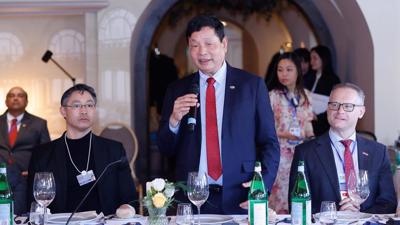Vietnam Pushes for Digitization of Public Services Amid Sluggish Progress
A Deputy Prime Minister has urged ministries and localities to accelerate the digitization of administrative procedures, lamenting the slow pace of reform.

At an online meeting on May 8th, Vietnam's Deputy Prime Minister Tran Luu Quang said ministries and provinces must "strictly implement timely, complete and accurate publication" of administrative procedures.
He emphasized promoting comprehensive online services to meet public and business expectations.
The Push for Digital Transformation
Mr. Quang's rebuke comes as Vietnam strives to streamline bureaucracy and improve its business climate through digitization. Measures include simplifying rules for firms, sharing data across government databases, and enabling online payments and document submission.
But implementation has lagged targets.
Only 14% of the Ministry of Information and Communications' records and 12% of the Foreign Ministry's had been synchronized on the National Public Service Portal, the meeting revealed. Localities like Tay Ninh (93.7%) and Quang Ninh (90.8%) fared better, but the rates were uneven.
The provision of fully online public services also trailed the 80% goal, from 67.56% in Da Nang to just 10.71% in Hanoi. Digital payments lingered below 45% for some agencies like the communications ministry (17.36%).
"There is still much work to be done," Mr. Quang told ministry and provincial leaders. He cited incomplete publication of procedures, lack of substantive reforms restructuring services, slow digitization and paltry data reuse across government.
Overcoming Institutional Inertia
The rebuke underscores Vietnam's challenges transitioning from an analog bureaucracy. Despite high-level directives, institutional inertia, outdated regulations and limited resources hinder digitization at the working levels.
Localities complained of delayed guidelines on norms for spending on digitizing records and documents. They also sought better database integration, payment gateway enhancements, and public disclosure rules. Quang Ninh, a frontrunner, proposed new policies enabling IT investments for digital transformation among other suggestions.
Tay Ninh, with over half its services online, lobbied to speed up issuing digital signature certificates -- an e-governance bottleneck. Such technical and capacity gaps could derail the national digital agenda.
To regain momentum, Mr. Quang ordered ministries like defense and foreign affairs to amend legal frameworks reducing business conditions and administrative burdens under their purview. The communications ministry must review plans to streamline telecom and IT licensing by January 2024 quotas.
He gave Hanoi, Ho Chi Minh City, Quang Ninh and Binh Duong provinces until 2024 to pilot one-stop shops allowing services across localities. The defense ministry too must integrate military conscription on the national portal this year.
Easing Public Frustrations
While the political will seems clear from the top, translating it into action will test Vietnam's reform mettle. With public debt nearing 37% of GDP, splurging on digital transformation may be unrealistic. More likely are piecemeal steps prioritizing high-impact services.
"Expecting an overnight overhaul is unreasonable," said a foreign business owner who declined to be named. "But simplifying burdensome procedures, going paperless and improving inter-agency data flows can have an outsized impact with the right focus."
Such incremental but concrete progress could catalyze broader reforms, easing Vietnam's transition to a modern, digital economy.







